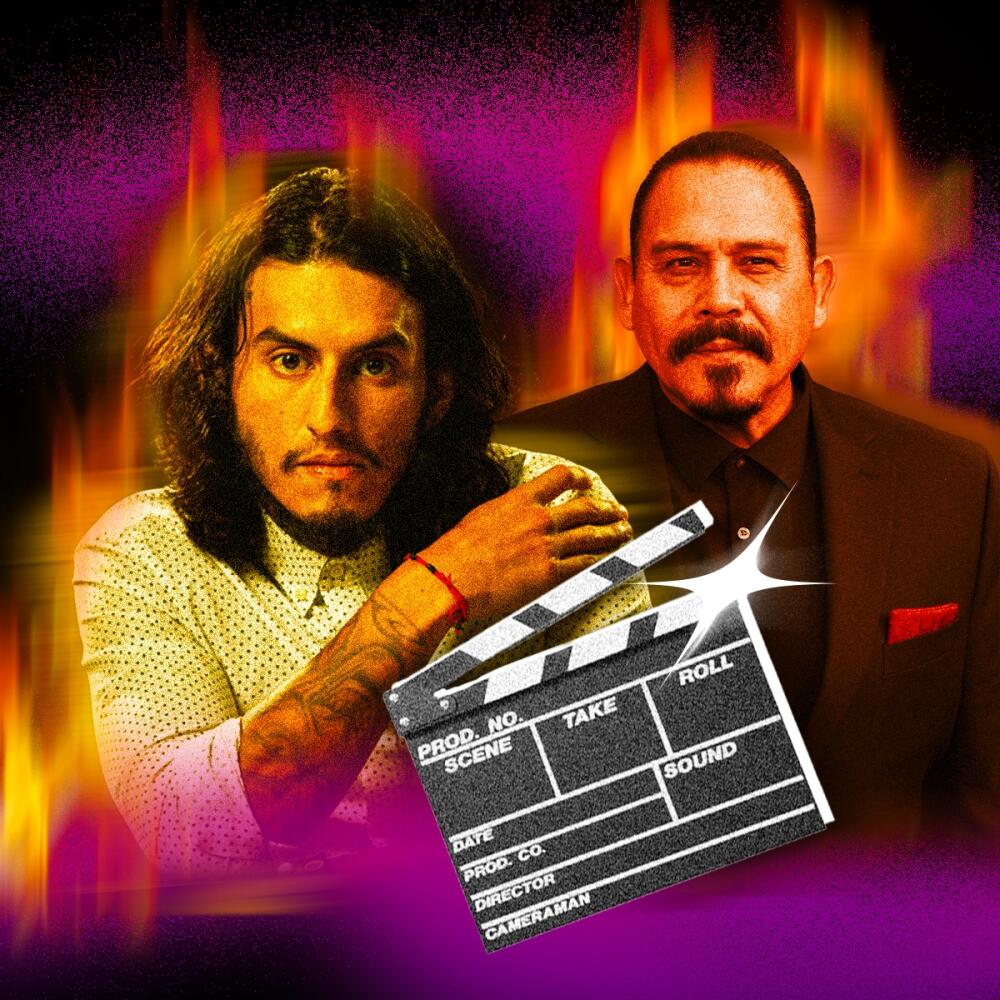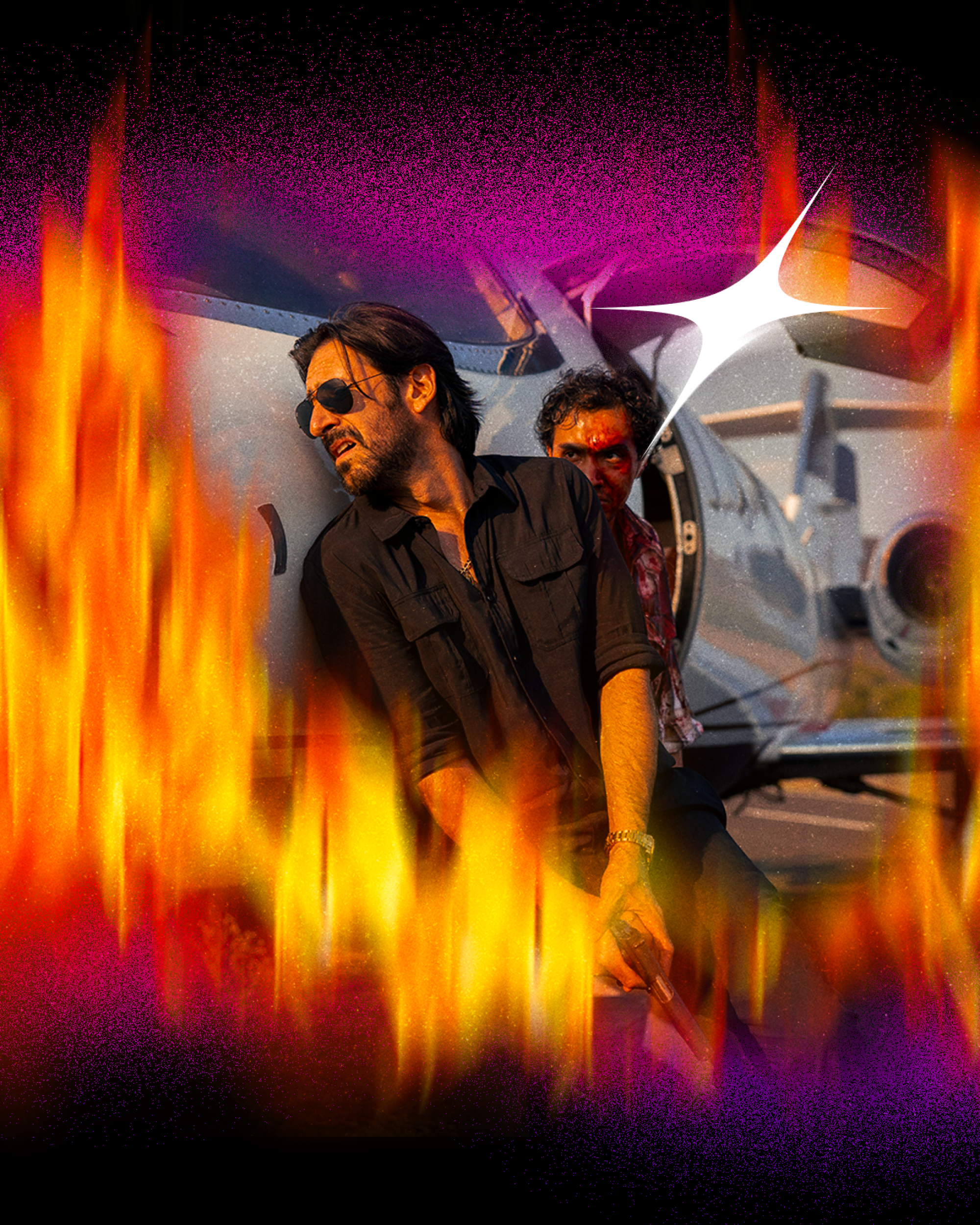
- Share via
The camera is close on his face: dark eyes squinting with menace, a weathered teardrop tattoo imprinted at the top of his tanned cheekbone, as he points a gun at his fear-stricken target. He’s killed before (see: teardrop tattoo), and he will pull the trigger resting cold upon his finger if his cartel, gang leader or the crooked FBI agent who put him in that position calls for it.
This is a man we know, because we’ve seen him on our screens countless times.
A 2019 study by USC’s Annenberg Inclusion Initiative found that 61.9% of Latinx characters in films from 2017 and 2018 were depicted engaging in illegal acts as part of an organized crime group. These depictions — or, rather, the overabundance of them — have caused plenty of frustration and upset over the years, especially when Latinx representation in Hollywood as a whole drags lower than a Chevy Impala that’s been involved in a drive-by on “Blue Bloods.”
When we know that media representations of communities of color create real-world biases that affect, even endanger lives, it’s easy to see why the near-constant portrayals of Latinx people as criminals is a problem. Still, it’s not so cut and dry, and the Latinx actors who’ve built prosperous careers off these characters have experienced firsthand the nuance within these hard conversations.
An exploration of marketing terms like ‘200%’ and how that’s shaped our identity.
“People will ask ‘Emilio, aren’t you scared of being typecast?’ ” says the beloved actor Emilio Rivera. “And I go, ‘Just be happy you’re a type.’ ” The 62-year-old San Antonio native has played 140 bad guys on screen, including in “Traffic,” “Sons of Anarchy,” and “Mayans M.C.” So, yeah, he’s a type. He’s done his time playing characters credited as Jail Inmate, Salazar Soldier #2, and Speedy. Most recently, he played Nacho Montañez in the feel-good, albeit divisive film “Flamin’ Hot.”
Rivera is very aware of the discourse that regularly revolves around the kind of men he plays on screen. He’s been asked plenty of times how he feels about portraying negative stereotypes — characters who, as it’s often put, make us all look bad.
“People would always say, ‘Well, we should be playing lawyers and doctors,’ and that’s a beautiful thing,” he says. “I’ve played the normal guy like 40 times. I’ve forgotten the show or the character that I played, but I always remember the bad guys because I had to dig deep for them.”
Digging deep means looking into his own past. There’s an old saying that writers use: Write what you know. Well, Rivera plays what he knows. His early life wasn’t too different from that of the guys he plays now, and he’s drawn on that experience over the years to bring truth and humanity to the villains he embodies on screen.
“It’s coming from a real place,” he says.
Over the years he’s worked closely with writers and directors, calling them on anything that’s fake or off about a character or their dialogue, and found ways to improve a script. All so he could play “the best bad guy I can be,” as he puts it. That care he shows his characters reflects the care he has for himself and his community.

The same goes for Richard Cabral, the 38-year-old actor who’s played villains on “Southland,” “Mayans M.C.” and “Chicago Fire,” and received an Emmy nomination in 2015 for his role as Hector Tontz in the ABC drama series “American Crime.”
Cabral spent years living a life of crime, serving time in prison after shooting a man following an altercation, and eventually reformed his life through work with the gang-rehabilitation nonprofit Homeboy Industries, which has a working relationship with Central Casting. He’d work in the organization’s bakery and go on auditions after his shift.
“You get voices saying what you should be doing. It’s never your voice. It’s other voices,” he says. “At the end of it, it’s a job and I’m grateful to have an amazing job — that I could story tell. And for me, when it comes down to this, there’s only a few people that can really speak on it in a truthful way, that have actually lived the bad-guy life in real life, that built a career.”
Like Rivera, he imbues his real experience into every character and works to make each one more than just a soulless evildoer. These characters, in many ways, are real to them and, as such, deserve the space and attention to be fully realized people.

Get Involved
“The bad guy was never justified,” Cabral says. “I got my Emmy nomination for playing the bad guy. My whole career has been based off the bad guy, but I have told the bad guy in a way that has never been told before.”
And the thing is, that approach has paid off. In 1995, Rivera was able to quit his day job after landing a role in the action-thriller film “Con Air.” He’s bought homes, sent his daughter to college, worked steadily for decades, and gained the respect of his peers and audiences alike.
Cabral has gone on to write and produce, bought a ranch in Mexico, and co-founded Tepito Coffee in Pasadena, which employs out of Homeboy Industries. He’s used his success to serve his community both in L.A. and Mexico.
And let’s not forget the legendary Danny Trejo, who capitalized on his image and popularity and built a massive empire of restaurants and products. This is a life most can only imagine, let alone anyone who started life in rough circumstances.
When questions of bad representation versus good representation come up, as they often do when it comes to Latinx people in Hollywood, it’s impossible for Rivera and Cabral to divorce their own experience from it. And it’s also impossible not to call bullshit.
“What happens is they’ll be like, ‘Hey, bro, you shouldn’t be playing that part, bro.’ Then why were you at the audition, bro?” says Rivera. “If you’re going to talk about it, be about it. All of a sudden you got guys who didn’t want to do this when they were 30 years old. All of a sudden they’re 55 years old with big tattoos on their necks so they can get a part. They saw you can actually make a good living out of it.”
“It’s an industry, it’s not some shit I created,” says Cabral. “It’s a system. I think a lot of people want to change systems, but they’re systems for a reason, not always for a good reason.
“Like there’s the Clint Eastwoods, right? There’s all these legendary people that that’s what they played, right? Why, if it wasn’t bad for them in the 1940s and 1930s and golden era, then why should it be bad now?”
The popularity of “Breaking Bad,” “Mayans M.C.,” “Narcos” and “Narcos: Mexico,” to name a small few, proves there’s interest in these tales of anti-heroes and malvivientes.
Hollywood execs and, if we’re being honest, audiences, love the bloody, drug-fueled stories of Mexican cartels waging war throughout the borderlands, gang members in street shootouts over claimed territory and criminals named Hector, Spooky or simply Henchman #2 being questioned by Det. Olivia Benson.
Oftentimes, they’re riveting stories. So, then what? Obviously, more varied Latinx stories and characters are the goal, as well as getting more Latinx creatives and executives behind the camera to foster those stories into fruition. And of course, just because something is popular doesn’t mean it’s good — or, rather, good for you.
But this isn’t a No. 2 Value Meal from McDonald’s — these are people, many of them real, many of whom have stories that frighten, entertain and speak of truths about life, whether we like those truths or not. And when there’s simply not very many options, not many jobs, then where does that leave people who want to work, and actually can? There’s not really an answer here, but many questions to consider around representation, elitism, respectability and control. But the big one to think about is this: Who are the real bad guys here?
Alex Zaragoza is a television writer and journalist covering culture and identity. Her work has appeared in VICE, NPR, O Magazine, and Rolling Stone, and she’s written on the series “Primo” and “Lopez v. Lopez.” She will write weekly for De Los.
The Latinx experience chronicled
Get the Latinx Files newsletter for stories that capture the multitudes within our communities.
You may occasionally receive promotional content from the Los Angeles Times.
More to Read
The Latinx experience chronicled
Get the Latinx Files newsletter for stories that capture the multitudes within our communities.
You may occasionally receive promotional content from the Los Angeles Times.








